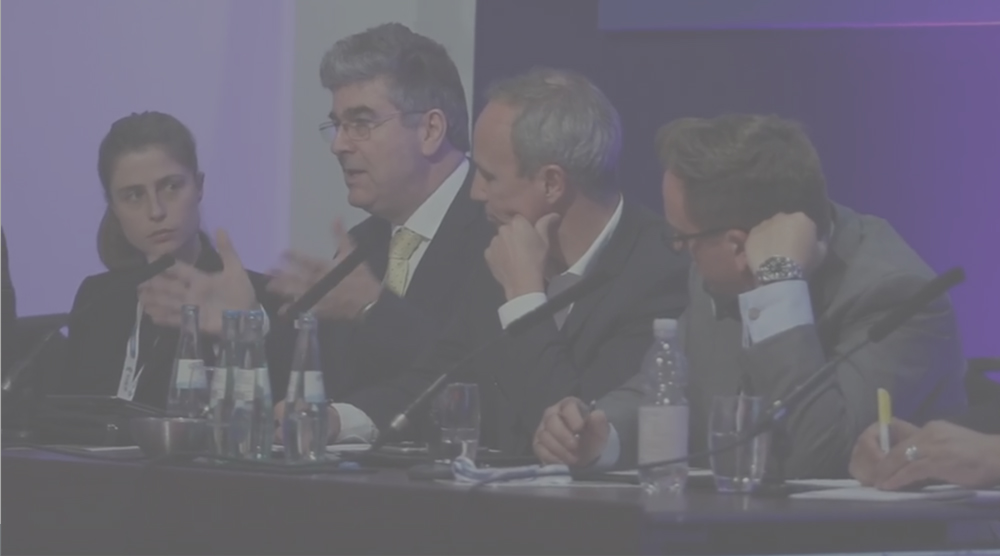Calastone attended Fund Forum International in Berlin, where many of the industry’s thought leaders gathered over the course of three days to discuss some of the burning issues currently impacting the asset management world. Ken Tregidgo, Calastone’s Deputy CEO, outlined his views about the role Blockchain will have in improving and disrupting fund transactional processes during a dynamic panel session.
Fellow panellists included Anthony Kirby, Head of Regulatory Intelligence, Capital Markets and Asset Management at EY, Jason Nabi, Global Head of Innovation at HSBC Securities Services, Christophe Lepitre, COO at OFI Asset Management, Jean Devambez, Head of Digital and Acceleration at BNP Paribas Securities Services, while the session was moderated by Lucie Munier, Legal and Business Associate at Qadre.
Inefficiencies in the industry
The panel highlighted that adverse and unprecedented macroeconomic conditions had made it increasingly challenging for asset managers to produce consistent returns, while the weight of global regulations and client pushback over fees were further eroding margins. Ken added that, on top of this, the funds industry was finding it difficult to attract mandates from younger investors. He pointed out that the entire sector was at a high risk of being drowned out by emergent, tech-savvy competition.
Despite this, the funds industry has an excellent opportunity to reinvent and future-proof itself by streamlining and automating many of the antiquated operational processes holding it back. Not least of these is distribution, a corner of the business which continues to be highly fragmented and intermediated. “Asset managers have seen the impact of disruptive technology – whether it is cloud computing, AI or Blockchain – on sectors they invest in, but they now need to ask themselves how these technologies can be applied to their own businesses,” said Tregidgo.
A new dawn for distribution
A study by Deloitte estimated inefficiencies in distribution added €1.3 billion a year in frictional trading costs to funds’ overheads in Luxembourg alone. These costs, however, could be significantly reduced if the industry migrates towards a mutualised distribution infrastructure underpinned by Blockchain.
A Blockchain facilitated mutualised infrastructure would create a golden source of truth, available in real-time, eradicating duplication, reducing errors and removing the need to conduct reconciliations. It would also simplify KYC and AML checks, making investment a more enjoyable experience. Not only will this infrastructure make customer onboarding a far simpler and quicker exercise, but the cost savings will help the asset management industry weather the growing competition from exchange traded funds (ETFs), index trackers and smart beta products.
Moving to the next stage
Jean Devambez said there were a number of exciting Blockchain initiatives coming to market over the next six to nine months, but caveated this by saying investors will not subscribe to a platform simply because it used DLT architecture alone. “Investors want an outstanding service at a good price, and they will not care about whether providers use Blockchain or not” he said.
Devambez added Blockchain’s wider application was conditional on several criteria being met. Interoperability and industry-wide consensus, the audience was told, were prerequisites for Blockchain infrastructures to prosper. “Industry cooperation is needed for Blockchain to succeed. There are absolutely no commercial benefits to be realised if we end up with a market where tens of thousands of different Blockchain platforms exist – all with their own unique protocols, and which do not interoperate. Such fragmentation is counterintuitive, so the industry needs to cooperate,” explained Devambez.
A number of asset managers and service providers at Fund Forum are being open minded about disruption and have recognised that they need to engage with each other if they are to make a success out of Blockchain. Many competing asset managers are therefore increasingly working together and collaborating across a variety of different DLT-related projects.
The debate around Blockchain will mature dramatically over the next 12 months as more asset managers recognise the commercial benefits the technology can bring in this increasingly competitive market. Transitioning onto a distributed market infrastructure will help augment the investment process for end clients, thereby enabling asset managers to rejuvenate and grow their businesses.










